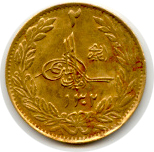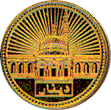MALAYSIA will start using gold dinar in its trade with some Islamic
countries by the middle of next year, says Special Economic Adviser
to the Prime Minister Tan Sri Nor Mohamed Yakcop.
The Government has started talks with a number of countries on the
adoption of the medium on a bilateral payment arrangement (BPA) basis,
he said.
“The process has started... we’d like to promote (the use of gold dinar)
and anchor it,” he said when asked for an update on the initiative.
Nor Mohamed was speaking to reporters after opening an international
conference on “Stable and Just Global Monetary System: Viability of
The Islamic Dinar” in Kuala Lumpur yesterday.
He did not identify the countries with which Malaysia has begun negotiations,
but said response has been good. Morocco, Libya and Bahrain are reportedly
among the West Asian countries to have expressed keen interest in using
gold dinar in trade.
Prime Minister Datuk Seri Dr Mahathir Mohamad had last year proposed
that gold dinar be adopted as a substitute currency for international
trade as it is more stable and less prone to speculative activities.
Dr Mahathir, who is also Finance Minister, suggested that gold dinar
be initially used to settle bilateral trade payments, and its adoption
widened progressively.
Malaysia has to date signed BPAs with 24 countries, but the Government
is ready to extend the use of gold dinar in trade with any other interested
party.
The mechanics were worked out by the Government early this year. In
his keynote address, Nor Mohamed said the gold dinar will start with
BPAs but will eventually cover multilateral payment arrangements (MPAs).
In the early stages, the gold dinar will not exist in physical form
and will be assigned a value in gold.
“For example, if 1 gold dinar is equivalent to 1 ounce of gold, and
the price of 1 ounce of gold is US$290 (US$1 = RM3.80), then the value
of 1 gold dinar will be US$290 or equivalent in other currencies, based
on prevailing exchange rates,” he said.
The actual settlement of trade can be done through the transfer of
equivalent amounts of gold.
However, this will not involve physical transfer from one country to
another, only of beneficial ownership in respective accounts.
Using trade between Malay- sia and Saudi Arabia as an example, he said
trade balances under their BPA will be settled every three months.
Malaysian exporters will be paid in ringgit by Bank Negara Malaysia
on the due date of exports based on the prevailing ringgit/dinar exchange
rate.
Similarly, importers will pay Bank Negara the ringgit equivalent of
their imports. In Saudi Arabia, its central bank will do the same for
the country’s exports and imports.
By the end of the three-month cycle, Malaysia’s exports to Saudi Arabia
total, say, 2 million gold dinar and Saudi Arabia’s total exports to
Malaysia 1.8 million dinar.
For the particular cycle, the Saudi central bank will therefore pay
Bank Negara 200,000 gold dinar.
Nor Mohamed said this can be done by the Saudi central bank transferring
200,000 ounces of gold in its custodian’s account with the Bank of England
in London to Bank Negara’s account with the same bank.
“The important point to note is that, under this mechanism, a relatively
small amount of 200,000 gold dinar is able to support a total trade
value of 3.8 million gold dinar.
“In other words, we optimise on the use of foreign exchange,” he said.
This way, countries that do not maintain large foreign exchange reserves
can still participate significantly in international trade.
On the use of dinar on MPA basis, Nor Mohamed said it works the same
way as with BPA but it will be even more efficient as it involves many
countries and not just two.
The mechanism can be refined further, for example, whereby the credit
or debit outstanding at the end of each quarter can be carried forward
and final settlement is made only at the end of the year, thus further
reducing payment flows.
It is timely for Islamic countries that have spent the last two decades
establishing domestic Islamic financial systems to move on to the next
stage, which is the establishment of an international one, he said.
The gold dinar, being a neutral currency, is also an ideal instrument
to facilitate trade among Islamic countries, he added.
The two-day conference is organised by the International Islamic University
of Malaysia
 THE GOLD DINAR RESEARCH GROUP
THE GOLD DINAR RESEARCH GROUP 